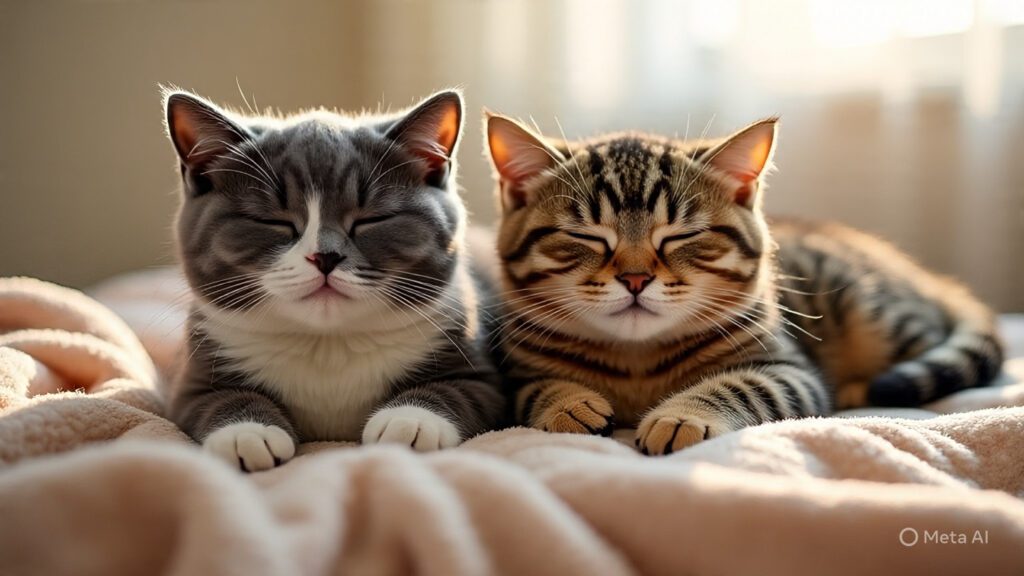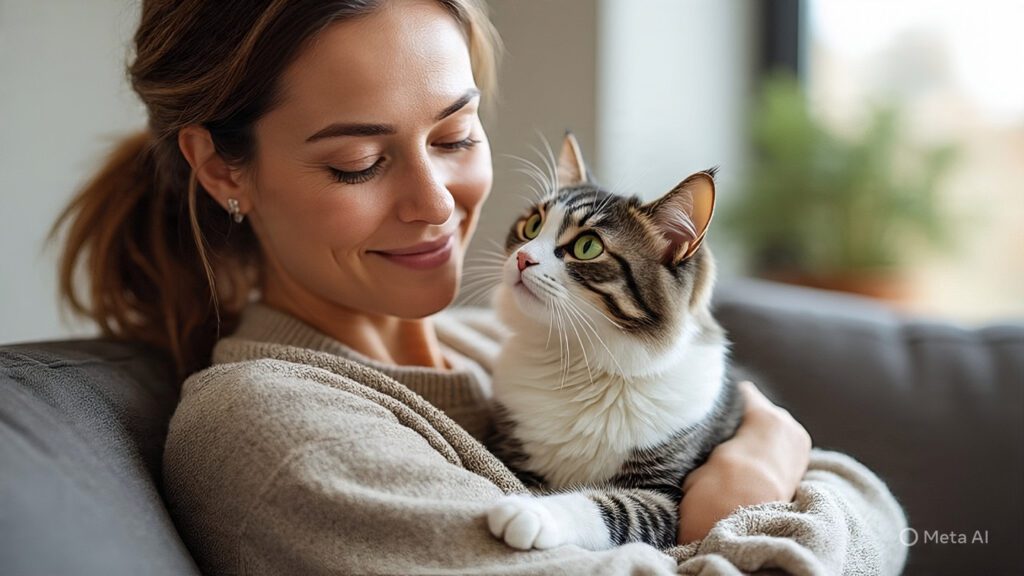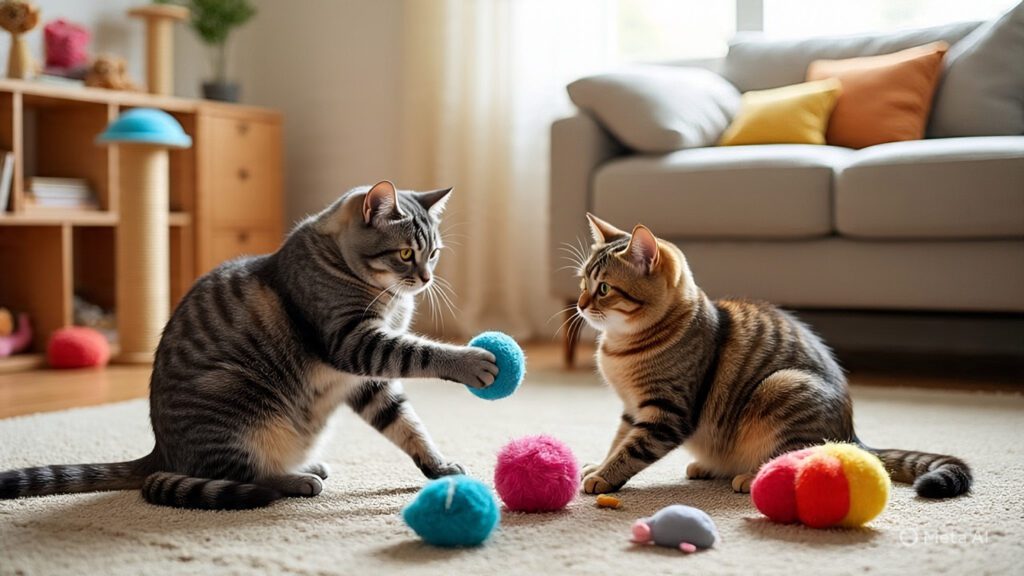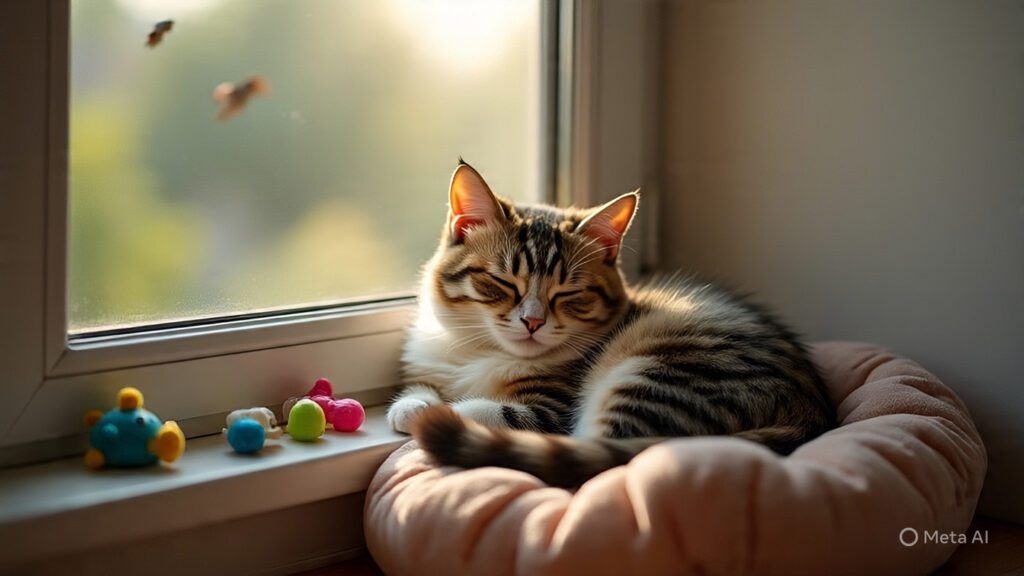We all know that cats have a way of slipping into our hearts and making themselves at home. They curl up on our laps and purr like little engines. They also seem to sense when we're sad.
But did you know that these cuddly tiny animals may also help with therapy and mental support? Yes, it is! In this essay, I'll talk about how cats can have a huge effect on our mental health.
Top Takeaways and Key Concepts
- Petting or cuddling cats reduces stress, lowers cortisol, and raises serotonin.
- Maintain daily routines for feeding and play to provide structure.
- Consider cats as emotional support or therapy animals for comfort.
- Schedule regular interactive play to boost mood and strengthen bonds.
- Create safe, quiet spaces for cats and owners to relax together.
Article Summary
This article highlights the profound mental health benefits of owning cats. Their purring promotes relaxation and may aid tissue repair, while petting reduces stress and releases oxytocin. Cats help maintain routines, giving owners purpose and structure that supports mental well-being. Many cats serve as emotional support or therapy animals, offering comfort in hospitals, schools, and homes. Regular play strengthens the bond between owner and cat, releasing endorphins and reducing anxiety. Creating safe, cozy spaces benefits both cats and humans, allowing relaxation and emotional connection. Overall, cats provide companionship, stress relief, and joy that positively affect mental health.
Video Summary
Please Note: This post may contain affiliate links. If you click one of them, we may receive a commission at no extra cost to you. As an Amazon Associate, I earn from qualifying purchases.
Jump to Content
Purring as Medicine: The Science Behind How Cats Feel Good

Have you ever noticed how calming a cat's purr can be? It sounds like nature's built-in music for relaxation.
Scientists have found that the sound of a cat's purr, which is between 25 and 150 Hertz, can help bones and tissues repair. So, if your cat cuddles up next to you, they might be making you feel better!
Studies show that spending time with pets can lower cortisol (the stress hormone) and raise serotonin (the feel-good chemical).
This means that when you pet your cat or listen to their calming purr, you're doing something good for your health and lowering your stress levels. Petting a cat has been demonstrated to release oxytocin, a hormone that helps people and animals bond and feel less stressed. Can you think of a better reason to let your cat sit on your lap? It's not only about being comfortable; it's also about making a therapeutic space where you and your pet can help each other.
Also, having a cat as a pet helps us stick to a schedule and be responsible. Cats do best when things are the same, so feeding them at the same times every day, playing with them, or making sure they have a warm place to sleep gives our days structure. People who are having trouble with depression or anxiety really need this kind of assistance. Taking care of another living being can offer us a sense of purpose and drive, which can help us fight emotions of laziness or discouragement.
Also, having a cat around can give you emotional support that can be very reassuring when things are tough. Their mischievous antics make us happy and giggle, while their tranquil presence makes our houses feel peaceful. When things get too much, cuddling up with a purring cat can make you feel better right away, like having a little therapist with you.
Studies have also shown that spending time with pets helps lower blood pressure and cortisol levels (the stress hormone), which can help enhance mental health in general. Some people think that the sound of purring itself has healing powers, as it may help tissues mend and lessen discomfort.
In conclusion, cats are more than simply cute pets; they are like little therapists with fur coats! They are always faithful and don't judge, which makes them a source of comfort while you're alone or in pain. Cats make our lives better in ways we often don't notice, like when they play with us or just sit quietly with us when things are tough.
In short, enjoying the benefits of having a cat buddy not only makes us feel better emotionally, but it also helps us develop better behaviors every day. So, the next time you and your pet cat are together, whether they're cuddled up on your lap or enthusiastically racing after toys, remember that this is a good thing for both of you: you're making each other feel better and making memories you'll treasure!
Handy Amazon Shopping Directory for Cat Supplies
Cat Food - Cat Toys - Cat Health - Grooming - Carriers - Cat Beds - Apparel
Furniture - Cat Doors - Collars - Feeding/Watering - Flea/Tick Control - Treats
More and More People Are Getting Cats as Emotional Support Animals

Honestly, who would have guessed that cats could be trained to help people with their feelings? Dogs get a lot of attention in this region, but cats are also making their impact! People are starting to realize how relaxing it is to have cats around when things get tough.
Imagine getting home after a long day and finding your cat waiting by the entrance, ready to greet you with warm purrs and headbutts.
It's nice to know that someone is looking forward to seeing you, even if it's just for food. For a lot of people with PTSD or anxiety disorders, owning an emotional support cat gives them a friend who won't judge them.
It's interesting that some groups now offer particular training programs just for therapy cats! These new programs are designed to help our cats learn how to connect with people in a number of situations, including hospitals, nursing homes, schools, and rehabilitation facilities. The idea is to provide these cats the tools they need to be able to offer comfort, companionship, and emotional support wherever they go.
Think about how much of a difference a fluffy cat can make for someone who is going through a hard period, such a patient recovering from surgery or a child who is anxious at school. Seeing a loving cat curl up next to someone who is upset can be quite comforting and calming right away. Therapy cats have a strange way of connecting with people and frequently know when someone needs extra love and care. Their quiet purring and loving presence make the room feel welcoming, which helps people recover and express their feelings.
Therapy cat programs not only help the people who need help, but they also make the lives of the cats participating better. These cats learn how to securely move about in different places and get rewards for good behavior through training. This experience helps them learn how to get along with other people and strengthens their attachment with their human handlers. It's a win-win situation: the cats get to use their brains and be active, and people get to spend time with them, which is priceless.
You might want to look into the possibility of your own cat being an emotional support animal or even doing therapy work if you've ever thought about it. Many cats are naturally good at this kind of job because they are patient, curious, compassionate, and good at making people feel better without overpowering them.
It's important to check your cat's mood before you start your trip. Not all cats will do well in therapy jobs; some may choose to stay at home rather than interact with people. But if your cat likes being held or seeks out attention from visitors, they may very well have what it takes!
If you want to start along this path, you might want to get in touch with local groups that work with therapy animals or pet-assisted therapy programs. They typically offer resources for training sessions or workshops where you can find out more about what it takes to become your cat a certified therapy animal. Many towns also hold programs or volunteer opportunities that focus on activities with animals that might help you and your pet learn new things.
In the end, getting your cat involved in such important activity not only makes their life better, but it also gives a lot of people who could use their love a chance to meet them. So why not jump in? You never know how much happiness your cat could bring to the world!
The Power of Play: How to Keep Cats Busy for Their Mental Health

Next, let's talk about how much we love playing with our furry friends! Not only is it really fun to play with our furry companions, but it can also be good for your health!
Whether it's tossing around feather toys or utilizing laser beams (which my cat thinks are out to get her), playtime is a great way for cats and their people to get to know each other better.
Playing with other people is a great way to get exercise and meet new people. Not only does this keep us fit and healthy, but it also makes us feel less alone!
In our busy lives, there are times when we put the needs and wants of our cats ahead of our adult duties. Instead of worrying about job deadlines or duties around the house, we lose ourselves in the happiness that our cats bring us. For example, when they make us laugh uncontrollably with their silly antics or run away from paper balls we throw across the room. It's not just fun to watch them pounce and play; it's also a nice reminder to enjoy the little things in life.
These special moments can really make our day. Watching them try to catch a toy mouse in a funny way or leap gracefully after a feather wand are both great ways to forget about the stress of everyday life. What I liked best was… When they run away from those paper balls like they're savage hunters on a mission! It's pure happiness in a furry package.
Because of all this, it's important for everyone to make time for kitty playtime every day. Not only does this time together make your bond with your pet stronger, but it also has several benefits for both of you. Playing with your cat on a regular basis helps build trust and love, which makes your cat feel safe and appreciated and strengthens your bond.
Also, playtime is important for both your cat's and your own mental and physical health. When you spend time with your cat, your body makes endorphins, which are natural mood boosters that are also called “feel-good” hormones. This release can help reduce tension and anxiety, serving as a natural antidepressant that makes you feel better overall. Playing with your cat may turn an ordinary day into one full of laughter and happiness.
Also, spending time with your pet helps you be more attentive since it lets you focus on the present instead of worrying about what you have to do tomorrow or regretting what you did yesterday. The fun energy that flows between you and your cat during these sessions can make you feel better and make memories that will last a lifetime.
So why not spend some time each day, even if it's just 10 minutes or an hour, with your beloved friend? Get some toys, roll out some paper balls, or even make an obstacle course out of things you have around the house! You might be amazed at how much fun you can have together while also making each other happier. Remember that even if life can be hard, there are always chances for happiness in the little things we do with our dogs. Take those moments to heart—they really do matter!
Making Safe Spaces: How Cats Help Us Get Better

It's crucial to make safe areas for both our pets and ourselves, to be fair. When we come home after a long day at work or coping with personal problems, we need to feel protected inside those four walls.
Cats know how to keep themselves safe, which is why they opt for peaceful places to sit, like corners or sunny spots. In reality, we can protect ourselves along with them by adding things like soft blankets or places to hide in the house (like a cardboard box!).
And here's the craziest part: hiding together and spending quiet time together is the best way to have fun, take a nap, or even get to know each other better on long, hot afternoons.
Lastly, and I want to make this very clear, cats are different; they are made to handle storms and love you no matter what!
Suggested Resources:
The Benefits of Pet Therapy
https://www.apa.org/monitor/2020/01/pet-therapy
How Pets Can Help with Anxiety
https://www.healthline.com/health/pets-and-anxiety
Emotional Support Animals Explained
https://www.nasap.org/emotional-support-animals.html
Frequently Asked Questions
Can cats really reduce stress and anxiety?
Yes, petting or cuddling cats can lower cortisol, raise serotonin, and promote relaxation, which can help reduce stress and anxiety in many people.
Do therapy cats need special training?
Some therapy programs do train cats to safely interact in hospitals, schools, or care facilities, but emotional support cats do not require formal certification.
How does a cat’s purr help with healing?
A cat’s purr ranges between 25 and 150 Hertz, a frequency range noted in research to potentially support tissue repair and pain reduction.
Can cats provide structure and routine for owners?
Yes, daily feeding, play, and care routines can help create consistency, which supports focus, motivation, and emotional stability.
Are all cats suited to emotional support or therapy work?
No, some cats enjoy social interaction and new environments, while others prefer staying home and avoiding unfamiliar people or places.
Does playtime benefit mental health?
Interactive play releases endorphins, reduces tension, builds bonds, and supports both emotional well-being and physical activity.
Why are quiet spaces important for emotional support?
Calm environments with cozy areas allow both cats and owners to decompress, relax, and feel secure, which can improve emotional balance.

Kevin Collier is a dedicated feline enthusiast and expert contributor at CatFAQ.com, where he shares his knowledge on cat health, training, and overall well-being. With years of experience caring for and studying cats, Kevin provides insightful tips and practical advice to help cat owners nurture and understand their pets better. His passion for enhancing the human-animal bond shines through in his articles, making them a valuable resource for anyone looking to improve their cat’s quality of life. Whether it’s training techniques or health care tips, Kevin aims to empower cat owners with the information they need to ensure their furry companions thrive.


